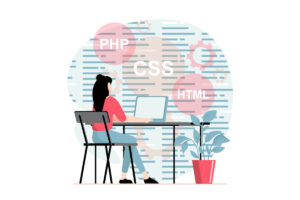In today’s digital age, where e-commerce has become a crucial part of global commerce, businesses are continually seeking robust solutions to build scalable, efficient, and effective online stores. PHP e-commerce frameworks have emerged as some of the most powerful tools in developing such platforms, offering a range of functionalities that cater to various business needs. This blog explores the top PHP e-commerce frameworks, aiding in the selection process for your next e-commerce project.
Introduction to PHP E-commerce Frameworks
Before we dive into the comparison and selection guide, let’s briefly introduce PHP e-commerce frameworks. These frameworks provide a foundation for building e-commerce websites, simplifying the development process by offering pre-built modules, templates, and plugins. With their powerful design capabilities and extensive feature sets, these frameworks enable developers to build bespoke online stores tailored to their specific requirements.
There are countless PHP e-commerce frameworks available in the market, each with its strengths and weaknesses. However, we have narrowed down the top four frameworks that stand out for their versatility, scalability, and robustness – Magento, WooCommerce, PrestaShop, and OpenCart.
Magento: The Powerhouse of E-commerce
Magento is arguably the most popular PHP e-commerce framework, known for its scalability and robustness. It offers an extensive range of features, including advanced product management, multi-store functionality, flexible pricing options, and powerful SEO tools. These features make it an ideal choice for large-scale online stores with high traffic volumes.
Magento also boasts a strong community support system and regular updates to keep up with the latest industry trends. However, its extensive features come with a steep learning curve, making it more suitable for experienced developers.
WooCommerce: The WordPress E-commerce Solution
WooCommerce is a powerful plugin for WordPress sites, turning them into fully functional e-commerce stores with minimal effort. It stands out for its seamless integration with WordPress, allowing businesses to leverage the robust features of the WordPress platform alongside the e-commerce capabilities of WooCommerce.
One of the major advantages of using WooCommerce is its user-friendly interface and flexibility. Users can choose from a wide range of themes and plugins to customize their online stores, making it an attractive option for those who wish to personalize their e-commerce experience. Furthermore, WooCommerce offers extensive documentation and community support, simplifying the process of setting up and managing an online store.
This makes WooCommerce one of the most widely used PHP e-commerce frameworks in the market, favored for its simplicity, scalability, and the vast ecosystem of WordPress plugins and themes available to users.
Symfony with Sylius: The Comprehensive PHP E-commerce Solution
The combination of Symfony, a leading PHP framework, with Sylius, an e-commerce platform, offers a comprehensive solution for developing online stores. Symfony’s flexibility and Sylius’s e-commerce capabilities create a powerful duo for building highly customizable and efficient online shops.
Key features and benefits of using Symfony with Sylius include a flexible architecture that allows for extensive customization, making it possible to tailor your e-commerce store to fit specific business needs precisely. Additionally, this combination boasts a wide range of functionalities, from product management to payment processing, all designed to enhance the user experience and streamline administrative processes.
The synergy between Symfony and Sylius leverages the strengths of both PHP frameworks, providing developers and businesses with a robust, scalable, and developer-friendly platform for their e-commerce solutions.
Laravel with Aimeos: The Dynamic Duo for E-commerce Development
Laravel, known for its expressive syntax and robust features, coupled with Aimeos, a comprehensive Laravel e-commerce package, presents an unmatched solution for building advanced online stores. It extends Laravel’s capabilities, offering a high-performance framework that can cater to e-commerce sites with millions of products and ultra-fast response times.
Aimeos as a Laravel package
Aimeos transforms Laravel into a fully-featured e-commerce platform, capable of handling global-scale business requirements with ease. It integrates seamlessly, leveraging Laravel’s elegant syntax and efficient ORM to provide a streamlined development experience.
Advantages of using Laravel with Aimeos for building e-commerce platforms
This combination excels in delivering flexibility, scalability, and customization. Developers can exploit Laravel’s MVC architecture and Aimeos’s extensive e-commerce functionalities to create unique, responsive, and secure online shopping experiences.
Zen Cart: An Established Contender in PHP E-commerce Frameworks
Zen Cart stands as a veteran in the realm of PHP e-commerce frameworks. Designed with store owners, programmers, and designers in mind, it offers a platform that is both user-friendly and infinitely customizable.
Zen Cart and its positioning in the market
Zen Cart has been a critical solution for small to medium-sized businesses looking to start online stores without the need for extensive programming knowledge. It emphasizes a community-driven approach, providing users with free, user-friendly software that integrates well with various payment and shipping modules.
Strengths and limitations of Zen Cart
Among its strengths are its open-source nature, extensive customization options, and strong community support. However, its limitations include a somewhat outdated architecture compared to newer frameworks and a steeper learning curve for those unfamiliar with PHP DevOps.
Ideal use cases for Zen Cart
It’s best suited for businesses seeking a cost-effective, highly customizable platform that relies on a strong community for support and enhancements. Zen Cart is particularly appealing to those comfortable with deeper technical involvement, including PHP DevOps, to tailor their e-commerce solution.
Future developments and enhancements
While Zen Cart may have some limitations, its developers are continuously working on improving the framework. Recent developments include updates to address security vulnerabilities, incorporation of responsive design for optimal mobile viewing, and integration with popular payment gateways such as PayPal.
Comparison and Selection Guide
When choosing the right framework for your e-commerce project, it’s vital to weigh the various factors that will influence your platform’s success. Factors to consider when selecting a framework include:
- Business Size and Scope: Small to medium businesses might favor Zen Cart for its community and cost-effectiveness, whereas larger enterprises may look towards frameworks with more advanced architectures.
- Customization Needs: Businesses requiring high customization levels will find Zen Cart appealing. In contrast, those needing a more straightforward, less tailored approach may opt for alternatives.
- Technical Expertise: Zen Cart is ideal for those with some technical background, especially in PHP. If your team lacks this, frameworks with easier installation and management might be more suitable.
- Future Scalability: Consider not only where your business stands today but where it aims to be in the future. Investing in a framework that can grow with your business is crucial.
Choosing the right e-commerce framework involves balancing these considerations against the unique needs and capabilities of your business, ensuring a platform that not only meets current requirements but is also poised for future growth.
Conclusion
The landscape of PHP e-commerce frameworks provides many options for businesses aiming to establish or expand their online stores. Each framework presents unique features and benefits, tailored to various business models and project requirements. By carefully evaluating and comparing these options, businesses can select the most appropriate framework to build scalable and successful online stores. It’s pertinent to stay up-to-date with the latest developments in these frameworks to leverage their full potential in your e-commerce projects. So, contact us today to start building your online business and take advantage of the power of PHP e-commerce frameworks.












+ There are no comments
Add yours